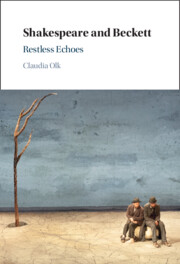Book contents
- Shakespeare and Beckett
- Shakespeare and Beckett
- Copyright page
- Contents
- Acknowledgements
- Abbreviations
- Introduction
- Chapter 1 Shakespeare and Beckett on the Edges
- Chapter 2 Molecular Shakespeare – Beckett Reading Shakespeare through Joyce
- Chapter 3 ‘Some remains’: Beckettian and Shakespearean Echoes
- Chapter 4 Purgatory and Pause – Shakespeare, Dante and the Lobster
- Chapter 5 ‘[It is] winter/Without journey’ – Still Lifes in Beckett and Shakespeare
- Chapter 6 Endgames
- Chapter 7 Theatres of Sleep
- Conclusion
- Bibliography
- Index
Chapter 4 - Purgatory and Pause – Shakespeare, Dante and the Lobster
Published online by Cambridge University Press: 19 January 2023
- Shakespeare and Beckett
- Shakespeare and Beckett
- Copyright page
- Contents
- Acknowledgements
- Abbreviations
- Introduction
- Chapter 1 Shakespeare and Beckett on the Edges
- Chapter 2 Molecular Shakespeare – Beckett Reading Shakespeare through Joyce
- Chapter 3 ‘Some remains’: Beckettian and Shakespearean Echoes
- Chapter 4 Purgatory and Pause – Shakespeare, Dante and the Lobster
- Chapter 5 ‘[It is] winter/Without journey’ – Still Lifes in Beckett and Shakespeare
- Chapter 6 Endgames
- Chapter 7 Theatres of Sleep
- Conclusion
- Bibliography
- Index
Summary
Liminal spaces of waiting and expectation are at the centre of this chapter that focuses on Hamlet, Waiting for Godot and Beckett’s short story ‘Dante and the Lobster’. The chapter draws on Stephen Greenblatt’s study Hamlet in Purgatory (2001) and on Daniela Caselli’s Beckett’s Dantes (2005), but it also takes the idea of purgatory to describe a dynamic, permeable space for intertextual dialogue. I argue that the texts of Beckett, Dante and Shakespeare do not appear as stable entities but rather are in flux and resonate with one another. Beckett’s recourse to purgatory is therefore not only the adaptation of a space for the imagination of medieval readers, but also a means of reflecting on the processes in which literary space is constructed. A main part of the chapter is devoted to the reading of ‘Dante and the Lobster‘ in dialogue with Hamlet and King Lear and also with the poetry of Thomas MacGreevy, from which many of its themes derive. ‘Dante and the Lobster’ and Hamlet converge on the notion of pause, and the chapter examines the ways in which both works become mutually interanimating in their reflections on dualisms, between human being and animal, Christ and the lobster, beginning and end, hesitation and rashness, fear and the embrace of death.
- Type
- Chapter
- Information
- Shakespeare and Beckett , pp. 97 - 122Publisher: Cambridge University PressPrint publication year: 2023

